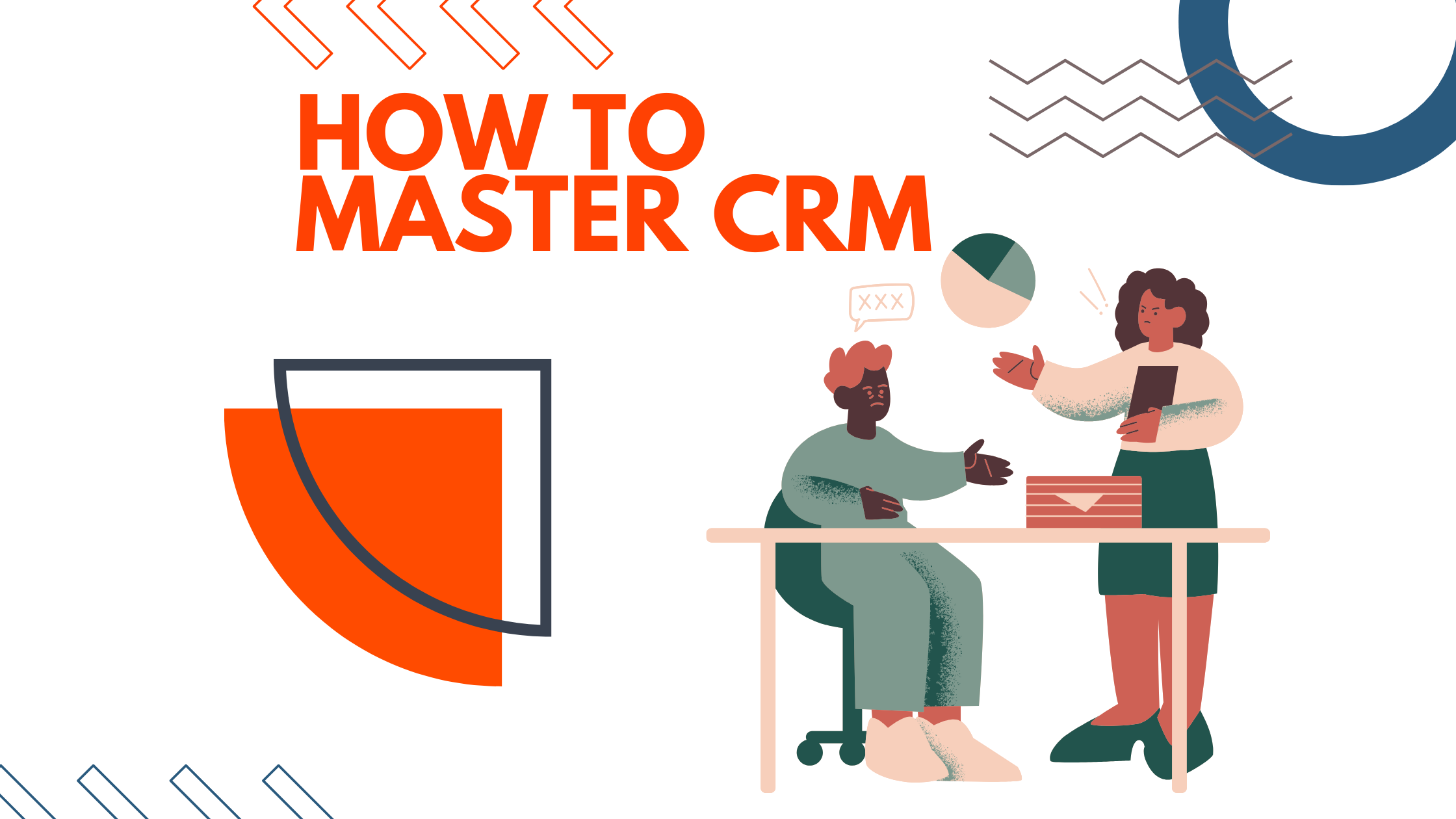Mastering Your CRM: A Comprehensive Guide for Businesses

Share this post
As your business grows, effectively managing your customer relationships becomes very important.
This is where Customer Relationship Management (CRM) systems step in - powerful platforms designed to assist businesses in efficiently organising and leveraging customer data.
CRM systems (opens in a new window) streamline sales processes, automate tasks, and enhance customer service – they enable your business to cultivate stronger customer connections and drive growth.
There are many benefits to having a CRM in a business. They can lead to improved customer service, more efficient sales processes, better decision-making due to data analysis, and ultimately, business growth.
In this post, Wave gives you tips on how to master your CRM and make sure it is working for your business.
Centralise Your Data Base
You should focus on centralising your database and consolidating the customer information you gather from various touch points. This integrated approach gives you a better understanding of your customer preferences, behaviours, and needs. Why is knowing this data important? It will help facilitate more personalised interactions and contextual conversations.
Consolidated data for marketing
Imagine your customer views one of your PPC ads suggesting they purchase one of your products or services. And, then they email your sales team asking for details about the service. However, these two instances are not connected and their activity data is not consolidated in one CRM. So what happens? Your marketing team sends them an email asking them to get in touch with another sales person. The result: a confused and maybe even annoyed customer.
Because your data was siloed, your processes have added unnecessary friction to the deal. But, with a consolidated CRM, your marketing would know the customer has reached out to sales, and they know to send a communication that pushes them towards a purchase within the context of their journey.
Consolidated data for Sales
Furthermore, businesses can leverage CRM systems to track sales activities, monitor pipeline progress, and generate valuable insights. By analysing sales data and customer feedback, companies can identify trends, optimise sales strategies, and make data-driven decisions.
Mastering CRM involves implementing a robust system, consolidating customer data, analysing insights, and empowering employees. With the right strategies and tools in place, businesses can harness the power of CRM to build stronger customer relationships, drive sales growth, and deliver exceptional customer experiences.
Read more: Do I need CRM software for my business?
Carefully plan your CRM Implementation and Usage
Implementing a CRM system requires careful planning. You'll need to choose a system that fits your business's needs, train your staff on how to use it, and ensure that it's integrated with your other business systems.
Once your CRM system is up and running, it's important to use it consistently (opens in a new window). This means regularly updating customer data, tracking customer interactions, and leveraging the system's analytics capabilities to gain insights into your customer base.
As with any other type of technology integration, there will be challenges to when your implement your new CRM as it's not a one-size-fits-all process. Each business has unique needs and goals that must be reflected in the implementation process.
However, here are some general best practices that can guide you towards successful CRM adoption:
- Identify Your Business Needs: Before selecting a CRM system, identify your business needs and goals. Understanding what you want to achieve with a CRM system can guide your selection process and ensure that the chosen tool aligns with your business objectives.
- Involve Key Stakeholders: Involve key stakeholders in the decision-making process. This includes not only executives but also those who will use the system on a daily basis. Their input can provide valuable insights into what features are necessary for the CRM.
- Ensure Data Quality: The effectiveness of a CRM system relies on the quality of the data it contains. Make sure to regularly update and clean your customer data to ensure that it remains accurate and relevant.
- Provide Training and Support: Training is crucial to ensure that your team can effectively use the CRM system. Provide comprehensive training and ongoing support to help your team leverage the full potential of the tool.
- Adopt a Phased Approach: Instead of implementing the CRM system all at once, consider a phased approach. This allows you to gradually introduce the new system and make adjustments as needed, based on feedback and results.
- Measure Success: Determine key performance indicators (KPIs) to measure the success of your CRM implementation. Regularly evaluate these KPIs and adjust your strategy as needed to ensure continuous improvement.
Remember, the success of a CRM system doesn't solely depend on technology, but on how well it's integrated into your business practices and processes.
Clearly communicate the benefits of the CRM system
One common issue businesses face is resistance to change. Employees used to a certain way of doing things may resist adopting a new system, especially if the benefits are not immediately clear (opens in a new window). Thus, clear communication about the benefits of the CRM system is crucial.
Manage Your Data Quality
Data quality is another major challenge. CRM systems are only as good as the data they contain. Incorrect or outdated customer data can lead to flawed strategies, ineffective marketing, and ultimately, missed opportunities (opens in a new window).
Integrate with your existing systems
Integration with existing systems can also pose a challenge. If the CRM system does not integrate smoothly with other business systems, it can lead to inefficiencies (opens in a new window) and data silos.
Lastly, many businesses underestimate the importance of training in CRM implementation. Without adequate training, employees may struggle to use the system effectively, reducing the potential benefits of the CRM system (opens in a new window).
The Role of CRM Training
Training is a crucial component of CRM mastery. Your team needs to understand not only how to use the CRM system, but also why it's important and how it can benefit your business. Investing onboarding and in ongoing CRM training can lead to more effective usage and ultimately, better results (opens in a new window).
It is important that onboarding not only covers the technical aspects of the CRM system but also clearly communicates the business benefits. Users should understand how the CRM tool assists in managing customer relationships, driving sales, and streamlining workflow processes. This can be achieved through practical demonstrations and real-life examples of CRM usage.
A well-structured onboarding process also encourages user buy-in, which is vital for successful CRM implementation. If the team understands the value and advantages of the CRM system, they are more likely to engage actively and use the tool effectively. Therefore, effective onboarding is an investment that can significantly impact the success of your CRM system and ultimately, contribute to business growth (opens in a new window).
Leverage Your CRM for Customer Engagement
One of the most powerful features of CRM systems is their ability to enhance customer engagement. By providing a comprehensive view of each customer, CRM systems allow businesses to personalise their interactions with customers, leading to increased customer satisfaction and loyalty(opens in a new window).
–> Download Wave's free ebook on the benefits of using your CRM to power your marketing.
Adhere to Diagnostic Standards and Practices for CRM Projects
To ensure the success of your CRM project, it's important to adhere to diagnostic standards and practices. These might include conducting a needs assessment before choosing a CRM system, regularly reviewing and updating your CRM processes, and using metrics to assess the effectiveness of your CRM efforts (opens in a new window).
Talk to wave to start mastering your crm
Mastering CRM is a journey, not a destination. It requires ongoing effort, continuous learning, and a commitment to leveraging CRM for the benefit of your customers and your business. But with the right approach, businesses of all sizes can use CRM to drive growth, improve customer relationships, and gain a competitive edge.
If you're ready to take your CRM usage to the next level, consider partnering with a MarTech consultancy like Wave Marketing. Our team of experts can provide guidance on CRM implementation, usage, and optimization, helping you get the most out of your CRM investment.





